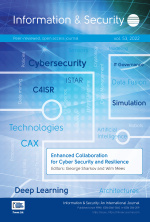On Simulation-based Wargaming: Comparison of Two Different Methodological Approaches
Source:
Information & Security: An International Journal,Keywords:
Assumption-based Planning, Intuition-based Decision-making, Operational Wargaming, simulation, Tactical Wargaming, WargamingAbstract:
Wargaming has been neglected within the German Forces for almost fifty years. Only within the last two years, two so-called “Leitfaden” (codes of best practice) have been developed. The first one, elaborated by members of the General Staff Academy, is intended for operational wargaming and fully rests on the traditional analytical comparison of different Courses of Action (CoA). Own and enemy CoAs are played against each other on the foundation of a game between two staff groups. Within this paradigm, simulations are used as evaluation tools. The reasoning is based on the premise that simulation systems are valid representations of reality. A successful simulation run is considered a corroboration of a particular course of action. The second “Leitfaden,” developed at the University of the Federal Armed Forces, is intended for so-called “tactical wargaming.” The two central concepts of this approach are intuition-based decision-making and assumption-based planning. The core rationale of this method is that all military planning and decision making is liable to what is called the “fog of war.” The irresolvable unpredictability of future developments in all military operations is considered an insurmountable obstacle to all analytical approaches. This approach rests on the claim that pattern recognition and mental simulation of these patterns are the most valuable cognitive functions of expert decision makers. Within this paradigm, simulations are used to support creativity, enhance imagination and trigger self-critical thinking. Simulation systems of complex systems are not necessarily regarded to be valid. This article discusses the pros and cons of the two approaches (“Leitfaden”) from both theoretical and practical perspective.
